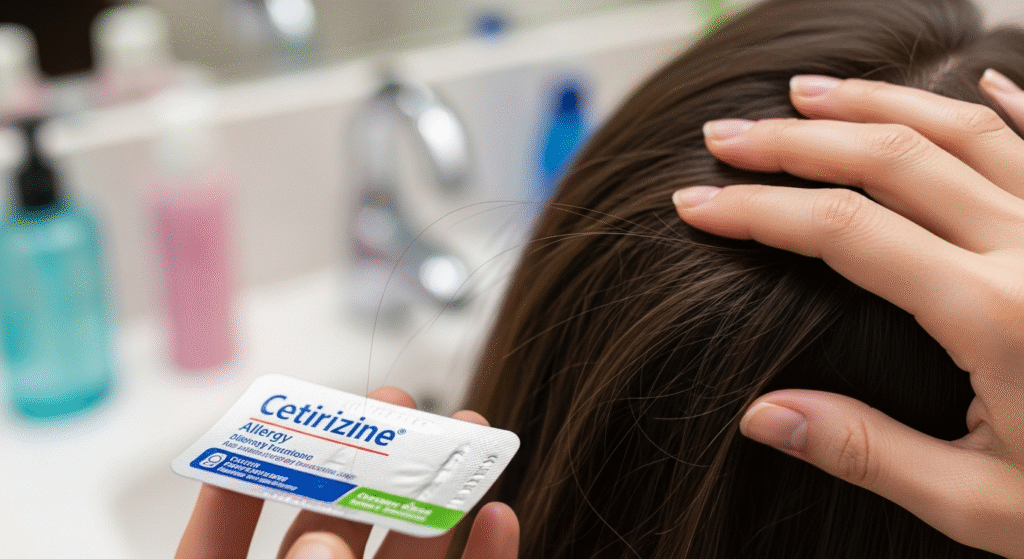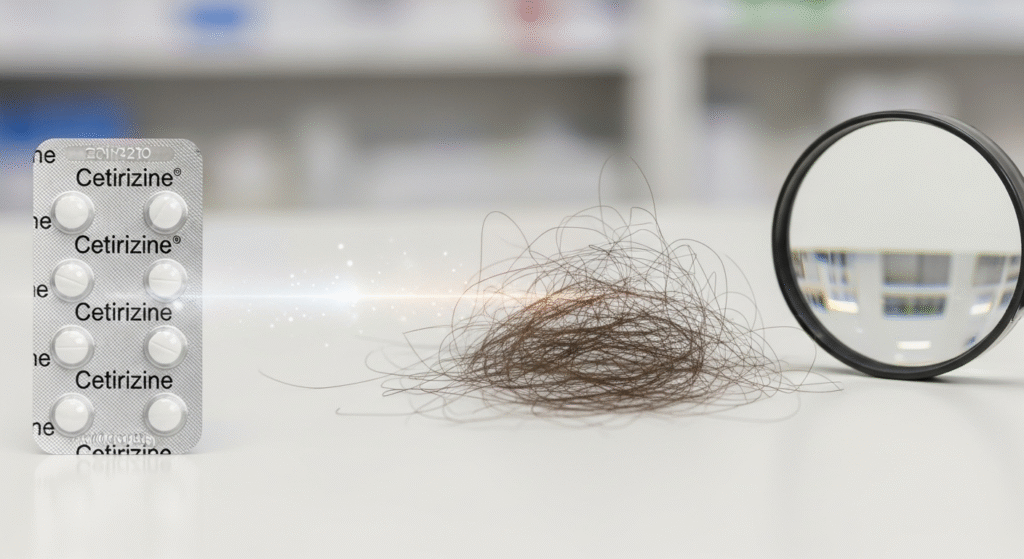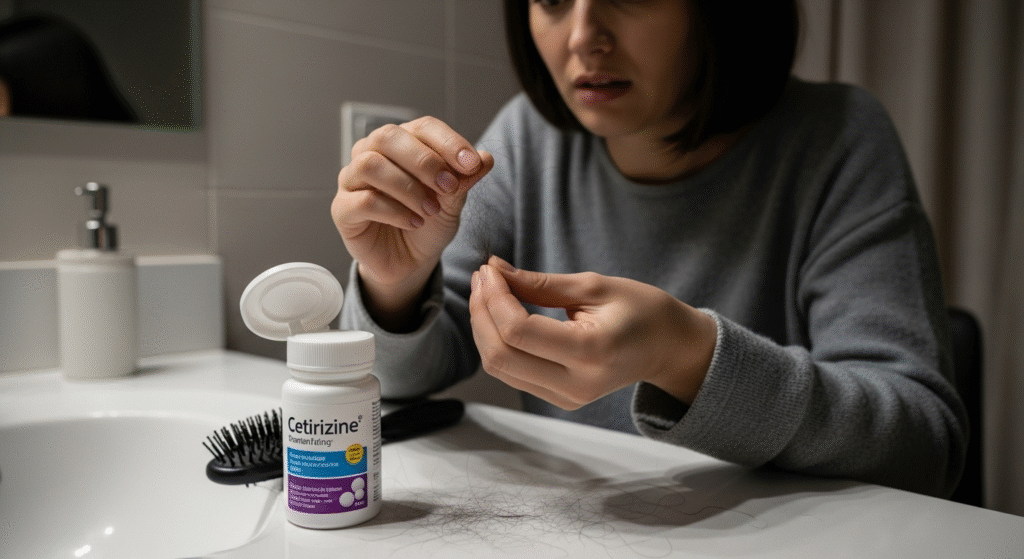Can Cetirizine Cause Hair Loss? If you're using cetirizine and hair loss has become a concern, you're not alone. Cetirizine, commonly known by the brand name Zyrtec, is a popular antihistamine used to relieve allergy symptoms. However, a number of users have reported unexpected hair thinning while taking it. In this article, we’ll explore the …
Can Cetirizine Cause Hair Loss? If you’re using cetirizine and hair loss has become a concern, you’re not alone. Cetirizine, commonly known by the brand name Zyrtec, is a popular antihistamine used to relieve allergy symptoms.
However, a number of users have reported unexpected hair thinning while taking it. In this article, we’ll explore the evidence behind this connection, compare oral vs. topical cetirizine, and share trusted insights to help you protect your hair health. You’ll get medically reviewed guidance, patient-centered advice, and practical solutions—all in one place.

Why People Worry: Can Cetirizine Cause Hair Loss
Reported Side Effects and Prevalence
While cetirizine is generally considered safe, some users report increased hair shedding during use. Officially, hair loss is not listed as a common side effect. However, anecdotal evidence from forums, blogs, and case reports suggests a possible link, especially in long-term users.
- Clinical trials report hair loss in <1% of participants.
- Some users in online communities suggest the rate might be higher—around 5–10%.
It’s worth noting that these are observational and self-reported cases, not clinically confirmed trends.
Hypothesized Mechanisms
Although the exact biological pathway is unclear, several potential mechanisms are suggested:
- Telogen effluvium: Cetirizine may trigger stress-related hair shedding.
- Nutrient absorption: Long-term antihistamine use might interfere with nutrient uptake (like zinc or iron), which are essential for healthy hair.
- Hormonal impact: Though rare, cetirizine could indirectly affect hormones involved in the hair cycle.
Risk Factors to Consider
You may be at greater risk if:
- You use cetirizine daily for months or years
- You have a history of autoimmune or hormonal hair loss
- Your diet lacks key hair-supportive nutrients
Emerging Research: Topical Cetirizine for Hair Growth

Interestingly, cetirizine in topical form may actually support hair growth.
How It Works
Topical cetirizine has shown promise due to its anti-inflammatory effects and ability to:
- Inhibit prostaglandin D2 (PGD2), which is elevated in bald scalps
- Promote pro-hair prostaglandins like PGE2
- Reduce inflammation around follicles
This creates a scalp environment conducive to hair growth—especially in androgenetic alopecia (pattern hair loss).
Key Clinical Trials

- A 2021 clinical study showed that 1% topical cetirizine increased hair density and thickness after 16 weeks, with no major side effects.
- Earlier studies indicated improved anagen (growth phase) duration, especially when combined with minoxidil.
Real-World Experiences
Many users on Reddit and hair loss forums report:
- Mild improvement in density and shedding
- Good tolerance and minimal irritation
- Better outcomes when paired with microneedling or finasteride
However, these are non-peer-reviewed anecdotes and should be taken cautiously.
Oral vs. Topical Cetirizine—A Side-by-Side Comparison
| Feature | Oral Cetirizine | Topical Cetirizine |
|---|---|---|
| Primary Use | Allergy relief | Hair regrowth (off-label) |
| Side Effects | Drowsiness, dry mouth, rare shedding | Minimal (mild scalp irritation) |
| Scientific Support | Moderate for allergies | Emerging for hair growth |
| Accessibility | Widely available OTC | Compounded or DIY |
| Long-Term Use Suitability | Yes, with doctor guidance | More research needed |
Expert Input and Case Studies
In a 2021 controlled study, participants using 1% topical cetirizine daily experienced:
- 16% increase in hair density
- Decrease in vellus (thin) hairs
- Improved scalp inflammation
These findings support further exploration, though large-scale trials are still lacking.
Practical Guidance: Managing Hair Health If You Use Cetirizine

1. Talk to Your Doctor First
If you notice increased hair shedding:
- Do not stop medication abruptly
- Document when the shedding started
- Consult your doctor about possible alternatives
2. Evaluate Contributing Factors
- Get lab tests for iron, ferritin, vitamin D, thyroid, and zinc
- Assess diet, sleep, stress levels, and other medications
3. Consider Switching or Supplementing
- Alternatives: Loratadine, Fexofenadine
- Support: Biotin, Omega-3s, anti-inflammatory foods
[Link to: Hair Nutrition Blog]
4. Scalp and Lifestyle Care
- Use mild, non-SLS shampoos
- Avoid excessive heat styling or harsh treatments
- Consider topical options like minoxidil or topical cetirizine with medical guidance
Summary and Take‑Home Messages
Support your recovery with scalp care, nutrition, and stress management.
Oral cetirizine may cause temporary shedding in rare cases, particularly among long-term users.
Topical cetirizine is a promising but experimental solution for hair regrowth.
If you’re concerned, consult your doctor, explore labs, and consider both oral alternatives and topical adjuncts.
FAQs
Can cetirizine cause permanent hair loss?
Very unlikely. Most cases of shedding are temporary (telogen effluvium) and reversible once the trigger is addressed.
How long before shedding stops?
If cetirizine is the cause, shedding may subside within 2–3 months of discontinuing use.
Is topical cetirizine FDA-approved for hair growth?
No. It’s considered off-label and typically compounded or used in experimental regimens.
Can I combine cetirizine with other hair treatments?
Yes, with caution. Many users safely combine it with minoxidil or microneedling—but always consult a specialist.
Are supplements helpful?
Yes. A healthy diet supported by zinc, vitamin D, biotin, and iron may counteract any nutrient-related hair loss.
Ready to take your next step
Book a consultation with Dr. Uzma Irfan, an ISHRS-certified surgeon, to assess your medication-related hair loss and get a personalized recovery plan. Whether you’re considering a switch in antihistamines or exploring topical solutions, professional guidance makes all the difference.






